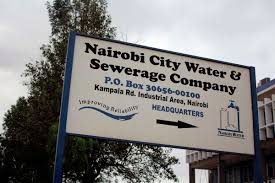Nairobi residents with illegal water connections have until the end of April to regularize their supply without facing penalties.
The Nairobi City Water and Sewerage Company Limited has announced a waiver on all penalties for those who come forward to legalize their connections before the deadline.
However, after April 30, the company will launch a crackdown, and those found with unlawful water connections will be charged, prosecuted, and required to pay fines.
In a public notice issued on Tuesday, the company said it had been losing over 50 per cent of the water supplied to the city due to non-revenue water, a significant portion of which comes from illegal connections.
Nairobi residents with such connections have been urged to visit any of the firm's regional office before April 30 to avoid penalties.
“Applicable penalties will be waived for customers who voluntarily regularize their water connections on or before Wednesday, 30th April 2025,” the notice read.
“Thereafter, any customer found with a water connection that is against the law shall be charged and prosecuted, in addition to being compelled to pay any applicable fines and penalties."
Nairobi County Government estimates that of the 560,000 cubic metres of water supplied daily, around 300,000 cubic metres are lost through illegal tapping and other irregularities.
A report from the county indicated that in 2023 alone, approximately 130 illegal connections were identified along the Lang’ata Pipeline, which serves Lang’ata, High Rise, Ngei Estate, and parts of Kibera.
The Auditor-General, Nancy Gathungu, previously highlighted the extent of water losses in Nairobi.
According to her report, Nairobi City Water and Sewerage Company produced 176.04 million cubic metres of water in 2020 but billed customers for only 86.35 million cubic metres.
The remaining 89.69 million cubic metres, which accounted for 51 per cent of the total supply, were classified as non-revenue water, including losses from illegal connections.
The company stressed that these illegal connections not only hinder the fair distribution of water but also threaten the quality of supply and pose risks to public health.
“It is our mandate to ensure equitable distribution of water to all customers; however, water connections against the law continue to undermine this principle and pose significant risks to both the quality of our water supply and public health,” the notice stated.
Residents were also reminded to clear their water bills on time to prevent supply disruptions.
The renewed drive to curb illegal water connections comes as the county government aims to boost its revenue collection to Sh20 billion, up from the Sh12.8 billion collected in the last financial year.
As the deadline approaches, Nairobi Water has assured the public that legalizing connections will help improve service delivery and ensure a more reliable water supply across the city.
